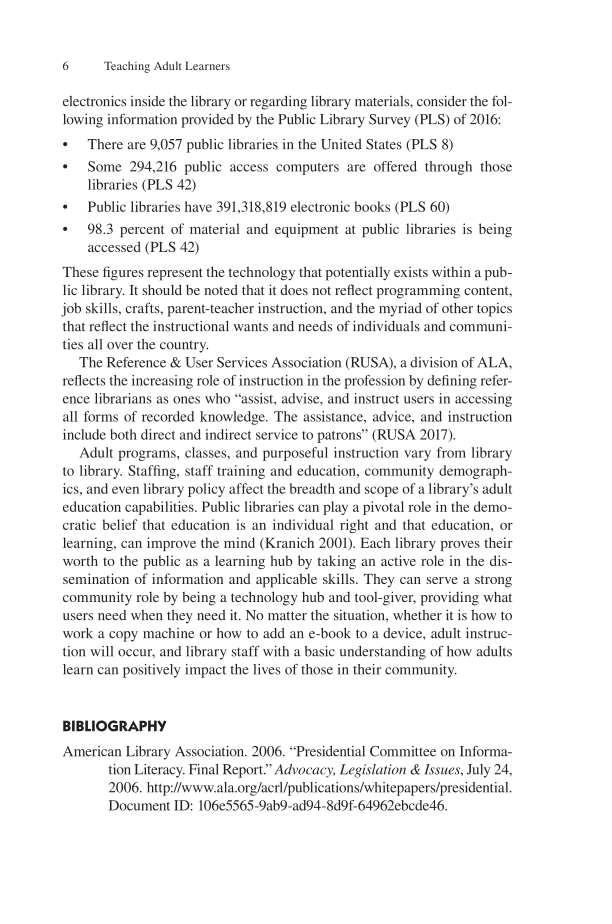6 Teaching Adult Learners electronics inside the library or regarding library materials, consider the fol- lowing information provided by the Public Library Survey (PLS) of 2016: • There are 9,057 public libraries in the United States (PLS 8) • Some 294,216 public access computers are offered through those libraries (PLS 42) • Public libraries have 391,318,819 electronic books (PLS 60) • 98.3 percent of material and equipment at public libraries is being accessed (PLS 42) These figures represent the technology that potentially exists within a pub- lic library. It should be noted that it does not reflect programming content, job skills, crafts, parent-teacher instruction, and the myriad of other topics that reflect the instructional wants and needs of individuals and communi- ties all over the country. The Reference & User Services Association (RUSA), a division of ALA, reflects the increasing role of instruction in the profession by defining refer- ence librarians as ones who “assist, advise, and instruct users in accessing all forms of recorded knowledge. The assistance, advice, and instruction include both direct and indirect service to patrons” (RUSA 2017). Adult programs, classes, and purposeful instruction vary from library to library. Staffing, staff training and education, community demograph- ics, and even library policy affect the breadth and scope of a library’s adult education capabilities. Public libraries can play a pivotal role in the demo- cratic belief that education is an individual right and that education, or learning, can improve the mind (Kranich 2001). Each library proves their worth to the public as a learning hub by taking an active role in the dis- semination of information and applicable skills. They can serve a strong community role by being a technology hub and tool-giver, providing what users need when they need it. No matter the situation, whether it is how to work a copy machine or how to add an e-book to a device, adult instruc- tion will occur, and library staff with a basic understanding of how adults learn can positively impact the lives of those in their community. BIBLIOGRAPHY American Library Association. 2006. “Presidential Committee on Informa- tion Literacy. Final Report.” Advocacy, Legislation & Issues, July 24, 2006. http://www.ala.org/acrl/publications/whitepapers/presidential. Document ID: 106e5565-9ab9-ad94-8d9f-64962ebcde46.
Document Details My Account Print multiple pages
Print
You have printed 0 times in the last 24 hours.
Your print count will reset on at .
You may print 0 more time(s) before then.
You may print a maximum of 0 pages at a time.














































































































































